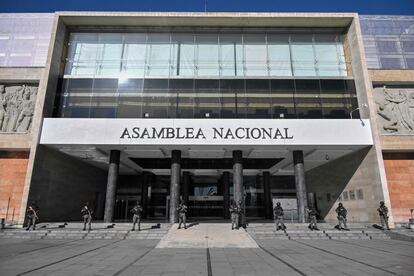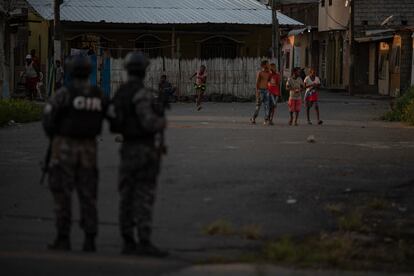Why the dissolution of Ecuador’s National Assembly has kept everyone happy
Contrary to expectation, President Lasso’s decision to call new elections did not spark mass protests, or even backlash from opposition political parties


“The internal commotion” that Ecuadorian President Guillermo Lasso claimed to be addressing on Wednesday with his decision to dissolve the National Assembly and call new elections did not translate into external commotion on the streets. In anticipation of protests, the National Assembly had been heavily guarded, while authorities in Quito had enacted a protocol to maintain public order in the capital. But these measures were unnecessary: the country received the news impassively.
Lasso, a right-wing former banker, dissolved Parliament to avoid an impeachment vote over corruption accusations that could have seen him kicked out of office. In disbanding the assembly, the conservative leader has given himself a more dignified way out. But not even Correísmo, the political movement built after former president Rafael Correa, has kicked up a fuss, despite being Lasso’s biggest political adversary. The abrupt end of term — Lasso was elected in 2021 and elections were not scheduled until 2025 — has given the left a chance to return to power and has spared Lasso the disgrace of impeachment. Everyone seems happy, although no one dares to admit it.
Ecuador’s National Assembly — which will remain closed until the next lawmakers take office — is the institution with the lowest credibility in the country. In March, its approval rating was barely 9%. And that is partly why its dissolution has not triggered any protests, even though it is one of the pillars of Ecuador’s democracy. Elections must be called within three months, and until then, Lasso will govern by decree. On Wednesday, he issued his first decree, signing a package of tax cuts.
Lasso’s decision to dissolve the National Assembly has allowed him to put a dignified end to what has been a difficult mandate. Violence has become a national emergency in Ecuador. Drug trafficking groups, with ties in Mexico and Colombia, have extended their power throughout the country, which is undergoing the worst wave of violence in its history. And Lasso’s popularity had taken a hit.

The local elections in February were a major blow to Lasso. The left won in the country’s main cities and provinces, including Guayaquil, the second-largest city in Ecuador, which had been governed by the right for the past 30 years. Lasso took advantage of the local elections to launch a referendum on security, in a bid to demonstrate the popular support for his measures. But that didn’t work either: more than 50% of voters opposed his proposals.
In the end, it was the specter of corruption that pushed Lasso into a corner. For months, the president had been dragged down in a scandal over graft in state-owned companies, a network allegedly led by his brother-in-law. The impeachment proceedings — backed by the Constitutional Court, the institution with the highest credibility in the country — placed him in a very tight spot.
Before dissolving parliament, Lasso had tried to negotiate with his political opponents to ensure that a majority would vote against impeaching him. But the risk of betrayal was too high: the president preferred to leave on his own terms rather than risk being impeached. On Wednesday, he used the constitutional power that allows him to dissolve the assembly and call for new elections. It’s colloquially known as “la muerte cruzada,” or “the crossed death,” because it cuts short the mandate of both the assembly and the president.
When announcing the move, Lasso accused parliamentarians of having a plan to “destabilize the government, democracy and the state.” In other words, he tried to shift the blame to the lawmakers. The armed forces immediately offered support and promised to maintain public order in the event of social unrest, a situation that has not happened yet.
The feeling in Ecuador today is now one of a country preparing for an election, rather than one in the midst of a political crisis. In the coming days, the National Electoral Council (CNE) will announce the date of the elections, which in principle are expected by the end of August. In Ecuador, the presidential elections are held in two rounds, with one month between the first vote and the runoff. Given that many candidates tend to run, it’s difficult to win the 40% needed to win outright in the first round — a feat that has only been achieved by Correa, when he was elected in 2009. Indeed, Correa remains the biggest name in national politics, even though he lives in Belgium and is unable to return to Ecuador due to a conviction for corruption.
Correa on Wednesday tried to play both sides: on the one hand, he argued that Lasso’s claim that the National Assembly is to blame for the political crisis was a lie, and on the other, he said that dissolving it was the best way for the country to move forward. Correa — who believes his conviction is due to political persecution — is trying to find a way to return to the country. In the meantime, he continues to influence the party and its candidates.
In Ecuador, there are two forces that bring people out to the streets: Correísmo and the indigenous community. While Correísmo appears to be appeased by the fact elections will be held soon, given it is leading in the polls, there was doubt over how the Confederation of Indigenous Nationalities of Ecuador (CONAIE) would respond. It had previously said that it would call protests if Lasso invoked the “crossed death,” but in a statement on Wednesday, it said that it would remain alert and mobilize if Lasso abused his power to pass legislation by decree. For now, it has ruled out demonstrations.
With the military and the police surrounding the National Assembly building on Wednesday morning, there were fears that it would be the scene of social riots. But with the exception of the lawmakers who found out that they could not enter and were asked to go home sine die, no one else approached the building.
Sign up for our weekly newsletter to get more English-language news coverage from EL PAÍS USA Edition
Tu suscripción se está usando en otro dispositivo
¿Quieres añadir otro usuario a tu suscripción?
Si continúas leyendo en este dispositivo, no se podrá leer en el otro.
FlechaTu suscripción se está usando en otro dispositivo y solo puedes acceder a EL PAÍS desde un dispositivo a la vez.
Si quieres compartir tu cuenta, cambia tu suscripción a la modalidad Premium, así podrás añadir otro usuario. Cada uno accederá con su propia cuenta de email, lo que os permitirá personalizar vuestra experiencia en EL PAÍS.
¿Tienes una suscripción de empresa? Accede aquí para contratar más cuentas.
En el caso de no saber quién está usando tu cuenta, te recomendamos cambiar tu contraseña aquí.
Si decides continuar compartiendo tu cuenta, este mensaje se mostrará en tu dispositivo y en el de la otra persona que está usando tu cuenta de forma indefinida, afectando a tu experiencia de lectura. Puedes consultar aquí los términos y condiciones de la suscripción digital.








































